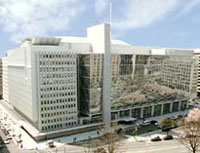 The resignation of Paul Wolfowitz has sparked a global debate about the choice of the next World Bank president. To help inform this debate, CGD has launched an online survey gathering views on the selection process, the desired qualifications, and perceptions of the qualifications of some of the possible candidates mentioned in press reports.
The resignation of Paul Wolfowitz has sparked a global debate about the choice of the next World Bank president. To help inform this debate, CGD has launched an online survey gathering views on the selection process, the desired qualifications, and perceptions of the qualifications of some of the possible candidates mentioned in press reports.
Invitations to complete the survey are being sent to several thousand people on the CGD mailing list. Members of the development community who are not on the list and wish to participate may take the survey on the CGD website. Responses are anonymous and results will be published daily.
"Online technologies have made it easier than ever before to aggregate the views of concerned individuals," said CGD president Nancy Birdsall. "While the survey does not use a randomized sample, and is therefore not scientifically valid as a representation of the views of the international community, we hope that it can nonetheless be a catalyst for a lively, informed discussion not only of the process but of the future of the Bank and the challenges its new head will face."
The survey includes five statements about possible changes in the selection process (respondents are asked whether they agree or disagree, and how strongly); five areas of experience, such as "effective manager" and "banking and finance experience," (to be ranked as not important, somewhat important, and very important), and ten of the names that have appeared in press reports as possible candidates.
For each name, respondents are asked to report their perceptions of the individual's experience (on a scale of 0 to 3, where 0=none, and 3=excellent). When the respondent has no knowledge or opinion, the field may be left blank.
CGD senior fellow David Wheeler, a former World Bank researcher who now heads the Center's climate change work, proposed the survey based on his long experience with the power of public information disclosure in other sectors--notably in ranking firms to cut pollution in developing countries. Wheeler is in the process of developing data to apply the same approach to reducing CO2 emissions from major sources, such as power plants.
He said that the survey results could be of interest now and in the future for U.S. and other officials and indeed for the new president: "Over and over again we have seen that when credible, appropriately targeted information is made available, people in positions of power and influence are more likely to make sound decisions and to act in the public interest."
In addition to making the raw survey results available online, researchers at the Center will analyze the results and explore potential lessons for future leadership selection at international institutions. Issues that could be examined include candidate identification, selection criteria, preference weightings, and the selection process itself.
Take the survey now
About the Possible Candidates Included in the Survey
The nine possible candidates included in the survey are listed below with links to their Wikipedia biographies. CGD staff did not consult with any of the individuals listed and arbitrarily limited the number of names to make the survey manageable; inclusion on this list does not imply endorsement by CGD. (The name of Ernesto Zedillo was removed from this list at his request.) Survey respondents are invited to suggest and score additional possible candidates.
|
Join the conversation about this survey. Read blog postings from CGD president Nancy Birdsall and senior fellow David Wheeler and share your views. |

